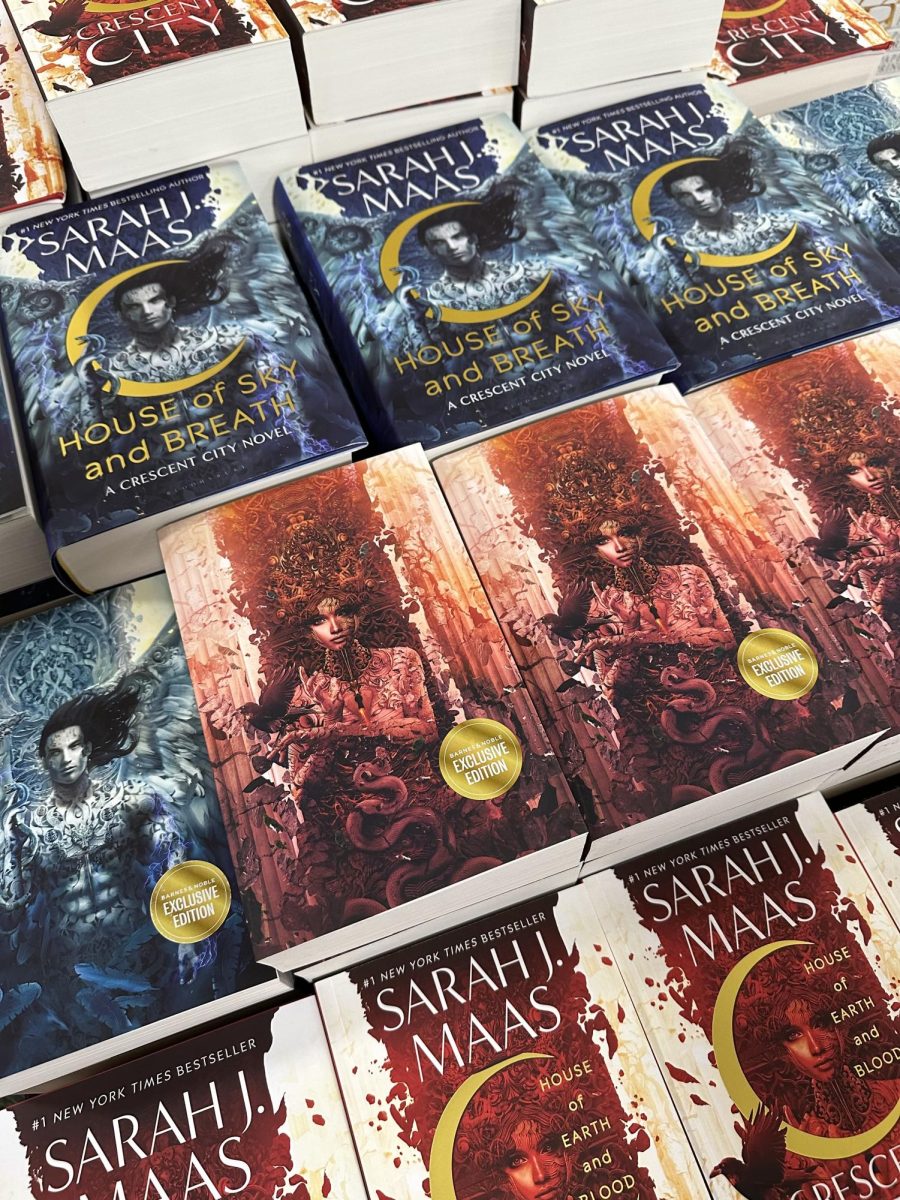When I first heard about the “A Court of Thorns and Roses” (ACOTAR) series by Sarah J. Maas, it seemed as though being a fan of the series was something to hide. Like all of Maas’ books, the “ACOTAR” novels fall into the fantasy romance genre, otherwise known as “romantasy.” Because romance is a large part of each novel, Maas’ books have become something that both romance and fantasy fans love, yet other readers regard the books as inappropriate and shameful, reducing them to romance books with no real value.
What people fail to give Maas credit for is the amount of real-world problems she dissects in her fantasy novels. Yes, there are a fair share of romantic scenes, but deeper issues are integrated into the plot.
Maas focuses on depression and the emotional turmoil that comes with loss in her most recent series, “Crescent City.” Its first installment, “House of Earth and Blood” (HOEAB), follows Bryce Quinlan, a half-human half-fae female, while she struggles with the aftermath of her best friend Danika’s sudden death. The male main character of “HOEAB” is Hunt Athalar, a brooding angel with a dark reputation, now enslaved to the city’s governor. We soon learn that Hunt has his own internal struggles, grief and self-loathing being just a couple.
Through the first two novels of “Crescent City”, “HOEAB” and “House of Sky and Breath,” readers see Bryce and Hunt’s relationship grow from simple snarky banter to a deep, meaningful relationship forged by shared trauma and the dream of a better life for themselves and their loved ones. This is one of the reasons why I get confused every time I hear any of Maas’ writing denigrated to spicy fantasy books with zero complexity.
Maas is also a highly acclaimed author. She has penned 17 books, 16 of which are split into three series, with a contract to write at least seven more. Furthermore, Maas is a #1 New York Times and bestselling author. The literary powerhouse has won the Goodreads Choice Awards for Best Fantasy three years in a row, from 2020 to 2022, and Best Young Adult Fantasy & Science Fiction from 2016 to 2018.
To belittle Maas’ work just because there are sexually explicit scenes is absurd. In all three series, Maas creates complex, tragic and beautiful storylines centering around relatable heroines with problems more similar to real life than some critics are willing to admit. An article by Entertainment Weekly phrases the dichotomy perfectly, stating, “Maas has devised entire universes… jam-packed with dynamic female characters who are rescuing entire worlds, while still finding time to deal with interpersonal conflict and build meaningful relationships. But she… [is] singled out, with a tee-hee, for ‘smutty’ passages.” The readers who obsess over Maas’ characters, of course, love the romance present in each series, but why does the inclusion of romance mean the books are lesser than other popular novels?
Maas’ most recent release, “House of Flame and Shadow” (HOFAS), came out this past Tuesday, Jan. 30. In the third “Crescent City” installment, Bryce is stranded in an unknown world, far from Hunt and the rest of her loved ones. She must find her way back to Midgard, her home planet, before the all-powerful Asteri can destroy her home and those that live there. Hunt, now trapped in the Asteri’s dungeons, has lost his freedom and the life he had with Bryce.
Though I haven’t yet finished reading the book, most reviews have been overwhelmingly positive. For example, on Goodreads, “HOFAS” currently boasts a 4.5 average rating (from a pool of over 56,000 reviews), and 62% of readers (almost 40,000 individuals) awarded the novel five stars. Less than 1% of people gave the new “Crescent City” book one star. The lofty praise from most readers proves how large of a following the author has, which grows rapidly with every new release.
Maas’ global fanbase read her books, “HOFAS” included, because of the flawless way Maas inserts common struggles into her fantasy worlds. The romance is something all fans love, as each relationship reflects what many people dream of, but Maas delves deeper into the complexities of what it means to be human. Her characters emulate how flawed we all are and don’t shy away from the ugly parts of humanity. When critics relegate Maas’ writing to something meant only for prurient teenage girls, they do readers and Maas herself a disservice.







































































































































































































Carrie Chatfield • Feb 23, 2024 at 6:14 pm
I love all her books.
Thank you for letting me get lost in your world.
I’ve been ill and the books help me cope❤️
Gloria P. • Feb 12, 2024 at 3:20 pm
I absolutely love the way Ms. Maas writes. Full of imagery, it’s as though I am right there. I do not think it is inappropriate with the romance part. Maybe a fluster here and there but I think it is limited in regards to issues at hand and how they all tie in. I have a friend who finished the ACOTAR series and now feels she’s in mourning. She’s starting Throne of Glass tonight. Thank you for a dynamic read.